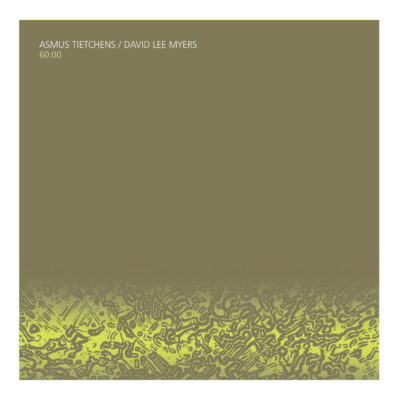Asmus Tietchens has done a lot of collaborations with a lot of people, but I believe the most work was done with David Lee Myers (the guy that used to be Arcane Device, and who is now back under his own name). ‘60.00’ is their fourth collaboration and it’s first in which the working principle was changed. Before Myers send raw sound material to Tietchens who transformed and made the compositions. Here blocks of sound were send back and forth all the time and each did his share of processing. In the end, it’s not clear who did what. A collaboration as it’s supposed to be, I believe. The principle sound source is still feedback, but don’t let that scare you off. The feedback sounds here all transformed in such a way that there is no harsh tone to be found. Instead the gentle sounds have only vaguely something in common with feedback sounds. Compared with the previous three collaborations they did, it seems that they have now moved in the areas of computer processed sounds. A track like ‘five’ seems to be built out of dsp-plug ins treating the feedback on a microscopic level. Tietchens recent album for Ritornell went already in that direction and here it is extended a little bit more. Small loops, going through various computer programms make this into a most delicate work, resulting in the most finest work of the two to date. And this work doesn’t sound like their end station, so this fruitfull collaboration will be even more fruitfull in the future.
(Vital Weekly, NL)
60:00 is the fourth collaboration between Asmus Tietchens and David Lee Myers, two true pioneers of modern electronic music. Tietchens, a German artist known for his electronic musique concrete compositions, is the duo’s primary sound manipulator and arranger. New York City’s Myers, a.k.a. Arcane Device, is the duo’s primary sound provider yielding, as always, aural whatnots from his homemade electronic feedback machines. Unlike their previous collaborations, which were exceptionally dynamic and exhibited a wide range of movement and sound, 60:00 applies a subdued palette of disembodied overtones in a meditative manner and as an environmental experiment that, in keeping with the times, is canvassed in a shroud of silence. The disc’s six untitled tracks reveal a jazz of minutia that glitch about within a backdrop of tinted shade and shadow. Sweeping traces of microscopic drones ebb and flow and create a temperate degree of tension throughout. The textures in the second untitled track have a stylistic drip-and-bump reminiscent to the humorous, staged bits between the three movements of Pink Floyd’s “Alan’s Psychedelic Breakfast”. What sounds like someone shuffling about the kitchen is actually a ghostly dance of incidental electronic detritus. This newest collaboration succeeds where the others didn’t in that it better expresses a sense of multidimensional space. Previously, the duo cast their manipulations within an artificially created sound environment saturated in reverb and other depth-deceiving effects. On 60:00, however, Tietchens and Myers simply allow each one of their handcrafted micro-sounds to frolic naked within the three-dimensional confines of the playback environment Ü rewarding the attentive listener with a rare glimpse into the future of minimal sound art, and providing the passive listener with new surround-sound hallucinations.
(Free Williamsburg, US)
Asmus Tietchens und David Lee Myers Kollaboration ist ein Stelldichein des statischen Echos. In einer grossen, leergersumten Halle erklingen etliche Klackergersusche, gepaart mit nervsem Kratzen und Quietschen. Musik die einem unentwegt Über die Schulter zu gucken scheint. So intensiv, dass man meint, sie beobachtet einen sogar dann noch, wenn sie schon langst nicht mehr ertsnt.
(de:Bug, DE)
Musique Concrete – dig it, baby. Asmus Teitchens (Mille Plateaux, Die Stadt) and David Lee Myers (RRRrecords) collaborate on their fourth project together, the not-so-cryptically titled 60:00. The process goes like this: beginning with raw feedback, tracks are repeatedly exchanged between the two composers in a live setting. Transformations and edits by each result in multiple layers of manipulation until the final pieces can no longer be identified as the original source material. Sounds exciting on paper, but in actuality 60:00 requires a patient ear and can open mind. Put this CD on while you’re at the computer or washing dishes and notice how it transcends background to become a subtext for the surrounding environment. “Is the faucet dripping?” “Did I leave the radio on?” What makes 60:00 different in terms of experience is the whole “non-sound” of it all – the unnerving perception (or deception, in this particular case) of music, and how it subverts the listener’s consciousness to a point where your refrigerator’s motor starts to sound funky. Ethereal, gritty, ghostly, 60:00 is the inner-voice of technology.
(welovemusique.com)
Don’t say “music”, but “presence”. Think about those feeble tones inside your ear when pressure (or something more vernacularly active) changes all your hearing perspectives for a few seconds; there are several sections in 60:00 that result in the same loss of aural balance – and that’s not all, of course. Tietchens and Myers stigmatize the fundamental uselessness of most commonly enjoyed kinds of music, forestalling any negative reaction since the very beginning of the record, sampling and accurately filing every microscopic nuance in an algid overview of a desert next to silence. Tietchens’ detached philosophy has brought Myers to follow him along a sonic visual that’s very distant from David Lee’s Arcane Device early mask. The icy character of this matter-of-fact experimentation does not weigh at all over the listening pleasure, which is assured for the whole hour; not that I had any doubt – these two know their own alchemy.
(Touching Extremes, IT)

